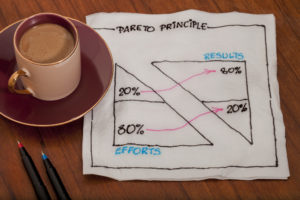You’re Wasting Your Time with Ineffective Language Lessons
If you’re looking for the best way to learn a new language, then you’ve come to the right place. Hopefully, your search wasn’t too exhausting. But, I have a feeling it was. Why? Because there are a lot of ineffective language learning methods out there. And there’s a lot of noise out there about the best way to learn a new language. But the truth is, it’s not that complicated.
First, we need to look at what methods don’t work. After all, if you’re eager to start speaking like a local, you need to avoid certain strategies. They will only waste your time and cause you endless amounts of frustration. Worse, they may lead you to believe that you can’t learn a new language. But once you know what to avoid, you’ll clearly see what works best.
Can You Learn a Foreign Language By Cramming?
No. But for some strange reason, people seem to still swear by it. They’re wrong. And if you’re one of these reluctant students who used to cram, then you’ve gotta face the facts here: cramming does NOT work. And it’s easy to see why once you understand how memory works.
Your brain sorts through a LOT of information on the daily. A LOT. Think about the last time you went to get a cup of coffee. You walked outside. Were there trees? Building? Birds Singing? How many people were on the sidewalk and what were they wearing? The truth is, you saw all of that information. But those memories faded quickly.

Why You Keep Forgetting Language Lessons
Your brain prunes information it doesn’t need. And it does this using a variety of methods. First, you have short-term, intermediate, and long-term memory. Only information that your brain interprets as relevant manages to survive the transition from short- to long-term memory. You also have to fight against neural pruning. This is where your brain breaks down neural pathways that are no longer in use.
Your brain is efficient in storing memories. And ANYTIME you learn ANYTHING, you have to fight against your brain as it rushes around trying to forget everything all the time. It’s frustrating. And it’s exactly why cramming for language learning doesn’t work.
Why REAL Learning Takes Time
If your goal is to speak fluently, then you need to remember your lessons. And sadly, that takes time. While you won’t need to spend hours and hours each day studying, you do need to regularly review lessons and explore new topics in your new language.
As you work your way through language lessons, you’ll slowly learn by forgetting. When you’re learning, you move from one topic to the next. Over time, your brain will work furiously to prune away that information. But as long as you revisit and review prior lessons, you’ll pull that knowledge to the surface. Repeat this process over and over again and after a while, your language lessons will stick.

That’s why cramming doesn’t work. You can’t rush your brain’s ability to store memories (with few exceptions). Sure, you can use strategies like mnemonics to make your lessons more effective. But at the end of the day, your brain needs time to physically build new neural connections to store that new information. There’s no rushing that.
Drilling and Memorization: The Best Ways to Learn a Language?
Not only are drilling and memorization ineffective, but they’re boring and can leave you feeling disinterested in your language learning journey. Worse, they can lead to burnout. So, why would you spend time doing something that’s not only boring but also ineffective? Well, most people don’t realize that there are better alternatives to dated, ineffective language-learning methods.
The stubborn acceptance of drilling and memorization comes from old-school foreign language classrooms. Some people just can’t seem to let these “learning strategies” go. They mistakenly believe you can somehow force a language into your brain. But that’s not how people learn a language. It might be how we study for a test, but it’s not how we LEARN a language…
Which Strategies Are Best for Learning a New Language?
Think about how a toddler learns to speak. Do you ever see a 3-year-old sitting down, looking at a list of verbs, memorizing conjugations? How about reviewing flashcards endlessly in the sandpit during recess? Probably not. What you do see are toddlers interacting with other children and adults. Attempting to speak to get what they want. That’s because children acquire languages by using them.

That’s a key difference. Young children acquire language. You acquired your first language. And if you do it right, you’ll acquire your next one. Are flashcards and drills effective? They can be if you have the right mindset and you use them properly. But, they’re not the BEST way to learn a language. In fact, if you deploy the right systems, you can learn a language without memorizing anything. At all!
The Difference Between Learning and Acquiring a Language
The key is to acquire your new language naturally with interesting, meaningful lessons that don’t leave you frustrated, annoyed, or bored. That differs from “learning” a language. When you learn, you’re a student in a lesson directed by a teacher. You’re passive. But when you acquire a language, you’re at the center of the experience, playing with the language. Using it. Testing it.
All too often, most language courses attempt to drill information into your head by forcing you to repeat dull, boring exercises. The “methodology” here is the blind hope that endless repetition will somehow help you eventually memorize a language…
On the flip side, there are other courses that expose you to a concept once or twice only to never show it again. It’s up to you to figure out when and how to repeat or review. Neither approach is optimal because it puts stress and pressure on you. Any effective language-learning platform that does its job should do the heavy lifting for you.
How OptiLingo Helps You Remember Your Language Lessons
You need a scientific approach to learning a new language. The key is to progress through your lessons and revisit previous at the right time, so you don’t forget what you’ve already acquired. That leaves you with two paths. You can either spend time planning out when to revisit your previous lessons, or you can trust in a language learning program that does it for you.
That’s exactly what OptiLingo does. You leave the science to us and focus on learning a new language. While other platforms either fall short on review or force you to brutally memorize new words, OptiLingo’s methodology has a built-in review system using our Spaced Repetition System (SRS). As a result, you learn to speak fluently faster.
- No cramming, hoping for results
- No endless, mind-numbing drills
- No random phrases or words you never see again
- No stressful, overwhelming lessons that leave you feeling broken and frustrated
- No worrying about when you need to review previous lessons so you don’t forget
OptiLingo works as the best way to learn a new language and review to remember. Instead of trying to figure out when you should review, OptiLingo guides you to revisit lessons at optimal times, pushing the content deeper into your long-term memory. It’s a stress-free, no-hassle way to learn a new language.







